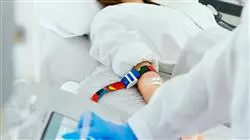University certificate
The world's largest faculty of medicine”
Why study at TECH?
This Advanced master’s degree is an incredible opportunity to attain, in just one course, each and every one of the skills required to perform an intervention in Integrative Medicine of the highest quality"

The field of Integrative Medicine is an emerging field of health sciences. In many developed countries there is a large percentage of the population that uses CAM at least once in their lifetime: 48% in Australia, 70% in Canada, 42% in the USA, 38% in Belgium, and 75% in France.
In countries such as the United Kingdom, Germany, Belgium, Holland, and Nordic countries, natural and complementary medicine is being incorporated into traditional health structures, following the conceptual line of this Advanced master’s degree. For example, 90% of pain management services in the United Kingdom and 70% in Germany include acupuncture among the treatments they provide. The European Agency for the Evaluation of Medicinal Products works on the quality, safety, and efficacy of herbal medicinal products and established a Working Group on herbal medicinal products in 1997.
The process of integration of both Medicines has led different organizations to invest human and economic capital to investigate the impact it could have on health and Social Security in many countries. In 1998, the European Union completed a COST (European Cooperation in the field of Scientific and Technical Research) project on non-conventional medicine.
Several governments participated with the aim of demonstrating the possibilities, limitations, and significance of alternative medicine, establishing a common scientific framework, harmonizing legislation, and helping to control healthcare costs. The CAMbrella project, a pan-European research network on natural therapies, was launched in January 2010 and has been funded with more than 1.5 million euros through the EU's Seventh Framework Program. The working groups that make up CAMrella focus on terminology, legal framework, patient needs, the role of natural therapy treatments in healthcare systems and research methodology.
It is worth highlighting the World Health Organization's indications in this regard and the explicit desire to incorporate Traditional Medicine at the global level (Strategy 2014-2023, WHO). Rapid advances and the need for constant updating in all these aspects require the professional to make an intense effort to remain at the forefront. An effort that may be too great to be taken on by working professionals. This Grand Master's Degree is a specialist training program, with a greater scientific, technical, teaching, and practical scope that provides you with all the necessary knowledge to be a leading physician in this area of intervention. Everything you need to know, in one place and with all the facilities for learning.
Join the medical elite with this Advanced master’s degree in Integrative Medicine. An exceptional, high-intensity program that represents a leap towards an extraordinary level of qualification"
This Advanced master’s degree in Integrative Medicine contains the most complete and up-to-date scientific program on the market. The most important features of the program include:
- Clinical cases presented by experts in the different specialties
- Graphic, schematic, and practical contents with the latest scientific and healthcare information
- Diagnostic and Therapeutic Developments in Gynecology and Assisted Reproduction
- Presentation of practical workshops on procedures, diagnosis, and treatment techniques
- Real images in high resolution and practical exercises where the self-evaluation process can be carried out to improve learning
- Algorithm-based interactive learning system for decision-making in the presented clinical situations
- Special emphasis on test-based medicine and research methodologies
- Theoretical lessons, questions to the expert, debate forums on controversial topics, and individual reflection assignments
- Content that is accessible from any fixed or portable device with an Internet connection
A Advanced master’s degree developed to provide a broad and up-to-date response to the needs of professionals in this area of intervention. The largest collection of high-quality scientific knowledge in the online teaching market"
Its teaching staff is made up of leading professionals in the sector. Practicing professionals who bring their experience to this training program, as well as renowned specialists from leading scientific societies.
The multimedia content developed with the latest educational technology will provide the professional with situated and contextual learning, i.e., a simulated environment that will provide immersive training program to train in real situations.
This program is designed around Problem Based Learning, whereby the physician must try to solve the different professional practice situations that arise during the course. For this purpose, the physician will be assisted by an innovative interactive video system created by renowned and experienced experts in the field with extensive teaching experience.

The contents, developed entirely by professionals in the sector, will allow you to assimilate the lessons that they have learned through their experience, with the incomparable possibility of having real examples and therapeutic situations"
Syllabus
The structure of this Advanced master’s degree has been created in order to compile each and every one of the subjects that professionals in this area ought to master, in a comprehensive but very specific syllabus. With an extensive course, structured in areas of intervention, the student will learn the different theoretical and practical approaches and techniques required for medical activity in Integrative Medicine. Learning that will translate into practical mastery of the techniques. Always with the tutoring and accompaniment of the exceptional teachers who have developed the contents.

This Advanced master’s degree is an incomparable opportunity to obtain, in a single training program, all the knowledge required in Integrative Medicine"
Module 1. Introduction to Integrative Medicine
1.1. History of Integrative Medicine
1.1.1. History of Integrative Medicine
1.2. Foundations and Indications.
1.2.1. Foundations of Integrative Medicine.
1.2.2. Indications.
1.3. How to Develop a Health Plan for the Patient.
1.3.1. The Health Plan: How to Develop It
1.4. The Sociology of Health.
1.4.1. Aspects of the Social Macrosystem that Affect Human Health.
1.4.2. Social Aspects Affecting Access to the System.
1.4.3. Limitations to the Practice of Integrative Medicine.
1.5. Medical History and Comprehensive Evaluation of the Person.
1.5.1. Medical History from the IM Perspective.
1.5.2. Comprehensive Assessment: Objectives and Results.
1.6. Integrative Approach from a Social Work Perspective.
1.6.1. Social Work and IM.
1.6.2. Integrative Approach from the Social Work Foundation.
1.7. Biological and Psychological stages in Humans. Age-Related Developmental Aspects.
1.7.1. Biological and Psychological stages in Humans.
1.7.2. Age-Related Developmental Aspects.
Module 2. Integrative Medicine and Health Prevention
2.1. Prevention, Health Education, and Lifestyles.
2.1.1. Preventive Nutrition.
2.2. Physical Activity and Sport.
2.3. The Patient as a Pro-Active Subject.
2.3.1. The Role of Nursing in Health and Integrative Medicine.
2.4. Community Networks as a Pillar of Prevention and Health Promotion.
2.4.1. Community Pharmacies.
2.4.2. Health Centers.
2.4.3. The Family Network.
2.4.4. GAM.
Module 3. Approaches and Strategies
3.1. Biological Model.
3.1.1. Interrelation of Physiological Systems.
3.1.2. Physiology and Mitochondrial Dysfunction.
3.1.3. Chronic Inflammation and Mucosal Permeability Syndromes.
3.1.4. Implication of Immune System disorders in Chronic Pathologies.
3.1.4.1. Autoimmunity.
3.1.5. The Role of Oxidative Stress.
3.1.6. Microbiota.
3.1.7. The Physiology of Detoxification.
3.2. Systemic Approach.
3.2.1. Gestalt.
3.2.2. Transgenerational.
3.3. Psychoanalytical Approach.
3.4. Cosmogony of Oriental Medicine.
3.4.1. Anthropological and Philosophical Aspects.
3.4.1.1 Kinanthropometry and Relationship with Kinetic Chains.
3.4.2. Acupoints from Human Embryology.
3.4.3. Scientific Foundations of Contemporary Acupuncture.
3.4.4. Microsystems.
3.4.4.1 Foot Reflexology.
3.4.4.2 Auricular Reflex Zone Technique.
3.4.4.3 Other Disciplines (Yamamoto Cranial Acupuncture YNSA).
3.5. Constitutional Imago, Archetype, and Diathesis.
Module 4. Pathophysiology.
4.1. Metabolic Networks.
4.1.1. Main Metabolic Pathways and their Clinical Implication:
4.1.1.1. Carbohydrate Metabolism.
4.1.1.2. Fat Metabolism.
4.1.1.3. Protein Metabolism.
4.2. Inflammation.
4.2.1. Main Inflammatory Mediators and their Pathways.
4.2.2. Microbiota and Inflammation.
4.2.3. Inflammation in Chronic Pathologies.
4.3. Immunity.
4.4. Neuropsychiatry and Biological Decoding.
4.4.1. Main Neurotransmitters and their Functions.
4.4.2. Gut-Brain Axis.
4.4.3. Brain/Immune System Interactions.
4.4.4. Microbiota and Depression.
Module 5. Diagnosis, Clinical and Complementary Analyses
5.1. Clinical Examination and Contact.
5.1.1. Medical History.
5.1.2. Semiological Aspects of IM.
5.1.2.1. Pulsology.
5.1.2.2. Neurofocal Dentistry, Oral Health, and TMJ.
5.1.2.3. Posturology and Kinetic Chains.
5.1.2.4. Chronobiology.
5.1.2.5. Chronobiology from Biochemistry.
5.2. Erythrocyte Fatty Acids.
5.3. Bone Metabolism.
5.4. Heavy Metal Test.
5.4.1. Heavy Metal Test, Timeliness and Performance.
5.4.2. Objectives of the Heavy Metal Test.
5.5. Study of the Microbiota and Intestinal Permeability.
5.6. Genetic Test.
5.6.1. Conducting a Genetic Test.
5.6.2. Relevance and Usefulness in IM.
5.7. Food Intolerance.
5.7.1. Detection and Approach.
5.7.2. Medical History in Intolerances.
5.8. GSE Allergies, Celiac Disease.
5.9. Health Technology.
5.9.1. Bioresonance.
5.9.2. Thermography.
5.10. Other Diagnostic Techniques.
Module 6. Environmental Medicine
6.1. Basic Concepts of Toxicology.
6.2. Diseases Caused by Environmental Factors.
6.2.1. Respiratory Allergies.
6.2.2. Cardiovascular Disease and Heavy Metals.
6.2.3. Cancer and Autoimmune Diseases as an Environmental Disease.
6.2.4. Chronic Fatigue Syndrome.
6.2.5. Central Sensitization Syndrome.
6.2.6. Fibromyalgia.
6.3. Electromagnetism.
6.3.1. ElectroSmog.
6.4. Chemical and Nutritional Sensitivities.
6.4.1. Chemical Sensitivity.
6.4.2. Nutritional Sensitivity.
6.5. Endocrine Disruptors.
6.5.1. Definition.
6.5.2. Endocrine Disruptors.
6.6. Creating Optimal Environments for the Restoration of Health.
6.6.1. Sick Building Syndrome.
6.6.2. Tools for the Prevention and Detection of Unhealthy Environments.
Module 7. Approach to Frequent Chronic Diseases in Integrative Medicine I
7.1. Environmental Illnesses.
7.1.1. Fibromyalgia.
7.1.2. Chronic Fatigue.
7.1.3. Electrosensitivity.
7.1.4. Multiple Chemical Sensitivity.
7.2. Dermatology.
7.3. Digestive System.
7.3.1. Gastritis.
7.3.2. Liver Diseases.
7.3.3. Celiac Disease in Adults.
7.4. Respiratory System.
7.5. Neurology.
7.5.1. Migraines.
7.5.2. Epilepsy.
7.5.3. CVA.
7.5.4. Peripheral Neuropathies.
Module 8. Approach to Frequent Chronic Diseases in Integrative Medicine II
8.1. Oncology.
8.1.1. Molecular Mechanisms.
8.2. Diet Therapy in Cancer.
8.3. Approach Techniques in Oncology.
8.3.1. Oncothermia and Hyperthermia.
8.3.2. Metabolic Treatment.
8.3.3. Endovenous Techniques.
8.3.4. Supplementation and Interactions.
8.3.5. Aromatherapy.
8.3.6. Mind-Body Techniques.
8.4. Palliative Care.
8.5. Endocrine:
8.5.1. Obesity.
8.5.2. Thyroid Disease.
8.5.2.1. Hypothyroidism.
8.5.2.2. Hyperthyroidism.
8.2.2.3. Thyroid Physiology and Multinodular Goiter. Solitary Thyroid Nodule.
8.5.3. Adrenal Gland Disorders.
8.5.4. Insulin Resistance and Diabetes.
8.6. Locomotor System.
8.6.1. Osteoarticular Pathology.
8.6.2. Rachis Pathology.
8.6.2.1. Movement Sciences Approach.
8.6.2.2. Visceral Osteopathy Approach.
8.6.3. Pain Relieving Techniques.
8.6.3.1. Arthritis
8.6.3.2. Other Injuries. Arthralgia and Myalgia.
8.7. Nephrology.
8.7.1. Nephrolithiasis.
8.7.2. Glomerulonephritis.
8.7.3. Chronic Renal Insufficiency.
8.8. Infectious Diseases.
8.8.1. Lyme Disease.
8.8.2. Slow Virus Disease.
8.8.2.1. EBV, CMV, HSV, VZV.
8.9. Cardiovascular.
Module 9. Ethical and Legal Aspects.
9.1. Cooperation in the Practice of ICTM (Bioethics).
9.2. Ethics in Clinical Decision-Making.
9.2.1. Code of Ethics.
9.3. Legislation, Scopes of Action.
9.3.1. Informed Consent.
9.3.2. GDPR European Regulations 2018.
9.3.3. Professional Skills.
Advanced Integrative Medicine
Module 10. Genomic Medicine
10.1. Introduction to Genomic Medicine.
10.2. Polymorphisms. Epigenetics.
10.3. Nutritional Genomics.
10.3.1. Nutrigenomics.
10.3.2. Functional food
10.3.3. Personalized Diet Therapy.
10.4. Pharmacogenomics.
10.5. Biomedicine. Biochemistry Overview.
Module 11. Advances in Integrative Medicine Techniques
11.1. Platelet Factors
11.2. Neural Therapy
11.3. Microimmunotherapy.
11.4. Mycology and Immunomodulation
11.5. Ozone Therapy
11.5.1. Biochemical Principles and Ozone Mechanism of Action
11.5.2. Clinical Evidence.
11.6. Orthomolecuar Supplementation, Phytotherapy, and Interactions
11.6.1. Phytotherapy.
11.7. Advances in Integrative Nutrition
11.7.1. Anti-Inflammatory Diet
11.7.2. Ketogenic Diet
11.7.3. Fasting
11.7.4. Diet Therapy to Rebalance Microbiota
Module 12. Integrative Medicine and Pediatrics
12.1. Introduction to Integrative Pediatrics.
12.2. The First 1000 Days of Life.
12.2.1. The Importance of Nutrition During Pregnancy. Supplementation.
12.2.2. The Importance of Breastfeeding.
12.2.3. Most Important Childhood Nutritional Deficits.
12.3. Nutrition.
12.3.1. From 2 Years Onwards: The Harvard Plate.
12.4. Nutritional Disorders
12.5. Mucosal Inflammation Syndrome. Pathophysiology of the Most Prevalent Pediatric Diseases.
12.6. Dysbiosis and Pediatric Uses of Probiotics.
12.7. Children's Integrative Oncology.
12.8. School for Parents.
12.9. Childhood Mental Disorders.
Module 13. Women's Health in Integrative Medicine
13.1. Puberty.
13.2. Fertility and Pregnancy.
13.2.1. Motherhood and its Challenges. Food.
13.2.2. Complementary Techniques to Support IVF.
13.2.2.1. Acupuncture.
13.2.2.2. Wellness Therapy (Supplementation, Body-Mind, Balneotherapy...)
13.3. Recurring Diseases in Gynecology.
13.3.1. Candidiasis.
13.3.2. Recurrent Cystitis.
13.3.3. Myomas.
13.3.4. Polycystic Ovary Syndrome.
13.3.5. Endometriosis.
13.3.6. HPV Infection.
13.3.7. Dysmenorrhea, Premenstrual Syndrome and Premenstrual Dysphoric Disorder.
13.3.8. Fibrocystic Mastopathy.
13.4. Menopause.
13.4.1. Most Frequent Problems.
13.4.2. Integrative Medicine Approach.
Module 14. Gerontology and Pathologies related to Oxidative Stress
14.1. Advances in Chronological Age Research.
14.1.1. Aging Population.
14.2. Measures for Active and Healthy Aging.
14.2.1. Anti-Aging Health.
14.3. Neurology.
14.3.1. Alzheimer’s Disease and Cognitive Deterioration.
14.3.1.1. Parkinson’s Disease.
14.3.1.2. Sensory Dysfunction.
14.3.2. Biomechanics.
14.3.2.1. Arthritis and Osteoarthritis.
14.3.2.2. Osteoporosis and Sarcopenia.
14.3.2.2.1. Muscles as a Metabolic Organ.
Module 15. Mental Health and the Helping Relationship
15.1. Life History.
15.1.1. Pathochrony.
15.2. Epidemiology and Prevalence of Mental Illness in the Population.
15.2.1. Epidemiology in Mental Illness.
15.2.2. Prevalence of Mental Pathology in the Population.
15.3. Advances in Neuropsychiatry.
15.3.1. Neuropsychiatry in the 21st Century.
15.4. Illness as a Pathway.
15.4.1. Coping with Illness.
15.4.2. Psychological Impact of Illness
15.5. Introduction to Coaching.
15.5.1. Powerful Questions.
15.5.2. Coaching Tools.
15.6. Effectiveness of Mind-Body Techniques in the Therapeutic Approach.
15.6.1. Yoga and Mindfulness.
15.6.2. Breathing Techniques.
15.6.3. Sound Therapy. Music Therapy.
15.6.4. Cardiac Coherence.
15.6.5. Bioenergetic Techniques.
15.6.6. Art Therapy and Creative Processes.
15.6.7. Psychoanalysis.
Module 16. Research
16.1. Evidence-Based Medicine in Integrative Medicine.
16.2. Fundamentals of Applied Research in TCAM.
16.3. Collaborative Work, Networks, and Resources in TQM Research.
Module 17. Information and Communication Technologies Applied to Integrative Medicine
17.1. Legal Aspects Related to the Application of ICT in Integrative Medicine.
17.1.1. GDPR European Regulations 20117.
17.2. Use of Biometric Tools.
17.2.1. Use and Function of Biometric Tools.
17.3. Application of Digital Clinical Self-Questionnaires.
17.3.1. Regulations.
17.3.2. Data Exploitation.
17.4. Use of Digital Medical History.
17.4.1. Management of Digital Files.
17.4.2. Structure and Collection of the Digital Medical History.
17.5. Platforms and Databases for Health Professionals.
17.5.1. Specific Platforms for Healthcare Professionals.
17.5.2. Databases.
17.6. Create and Manage your Own Digital Structure.
17.6.1. Related Economic Aspects.
17.6.2. Web Design and Development.
17.7. Search Engines and Marketing Strategies.
17.7.1. Positioning:
17.7.2. SEO.
17.7.3. SEM.
17.7.4. Algorithms.
17.8. Video Consultation.
17.8.1. Positive and Negative Aspects.
17.8.2. Implementation in Consultation.
17.9. Software Models of Interactions Based on Genomic Medicine.
17.9.1. Software Models.
17.9.2. Genomic Medicine and its Interaction with Development Software.

A unique, key, and decisive training experience to boost your professional development"
Professional Master's Degree in Integrative Medicine
In recent years, the number of people interested in accessing complementary medical services has increased significantly thanks to the positive influence that has been evidenced in the treatment of patients with chronic diseases. This, in turn, has led to the development of new procedures that integrate the strategies and techniques of conventional and alternative medicine in order to control symptomatology and side effects. Faced with an increasingly broad framework of job opportunities, there is a growing need for specialization. For this reason, at TECH Global University we have developed the Advanced Master's Degree in Integrative Medicine, a program oriented to the theoretical and practical training of professionals in the concepts and general principles of this discipline, as well as in the latest applications and currents used during medical interventions.
Specialize in the largest School of Medicine
TECH Global University offers you this Advanced Master's Degree in order to perfect your skills as a health professional. Our methodology, presented in a 100% online format, will allow you to learn the latest developments in the management of pain and chronic conditions in the different areas addressed by Integrative Medicine. From this, you will approach patients with complex and/or degenerative diseases to offer them natural and conventional medicinal treatments that potentiate the results and provide a positive prognosis; you will also develop personalized and clinically meaningful solutions focusing on the patient's lifestyle and well-being. With our graduate program you will achieve professional success, stand out in an emerging field and revalue your professional profile.







